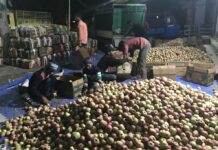As landholdings shrunk while passing from one generation to another, so did the interest in farming. Kashmir has come a long way from community farming to hired non-local labourers, Muhammad Younis reports

In Shith Parray Pora village of south Kashmir’s Pulwama district, Muhammad Ayoub Thoker, sits idle at the edge of a large swath of land, filled with water, barring the grassy berms that protrude out across (the plot) to mark the belongings of the farmers.
He waits for the labourers hired by his family to plant paddy seedlings in their field. It (his portion) lies in the middle of the plot before him.
As he is at rest, he passes his time spotting the non-local labours almost in every field: some are uprooting the seedlings from the nursery beds, mounted on their heads, some transport the seedling stacks in plastic baskets to the mainland, and others are doing the main work of plantation.
“Look at that, you seldom would be able to find any field owner doing the work himself. We don’t want to be connected with this occupation anymore, which otherwise used to be the sole source of our livelihood,” says Thoker indignantly. “We have become lazy and lethargic. Even if a person is unemployed, he doesn’t prefer to do the job.”
Thoker, whose beard makes known his old age, recounts his childhood days when his parents wouldn’t bear the sight of a single labourer in their fields, let alone bringing people from outside the state.
“We used to do all the work with our own hands,” he shows his bony hands, from the back of which sticks out his veins distinctly.
In his teens, recalls Thoker, there was a concept of harmony among people who would help each other with plantation and harvesting.
During plantation, people from Thoker’s Mohalla would form a group of the twenties and sometimes fifties (both male and female), to help each other. This was done irrespective of the varied measure of land holdings of farmers.
“We wouldn’t come out of the fields unless everyone’s field was done. But now rich pay hefty amounts to get their work completed as soon as possible, and not care about their neighbours,” recalls Thoker.
A kind of mini celebration used to be in each house during plantation and harvest.
“The person whose field you would be doing, he never would let you go home without meals. I have had meals in each house of my neighbourhood,” he said with a smile flickers on his face.
“Without any sort of remuneration, when you find people in dozens helping you in your field, you feel the essence of unity, a spirit of brotherhood. And it was the main reason we were like a family, a family which, as a collective one, copes with any bad thing.”
Thoker, a father of five, once used to be a sole owner of a few acres of land. “I inherited around two acres of land from my father. And it was just me to till the field and that too using a ploughshare. I would plant, cut, and winnow my harvest myself. Now, when my children have only a few Kanals to look after, they are not able to do that even, let alone to help others.”
For Thoker, working in the fields had its own health benefits, which the present generation is deprived off. “This generation sits idle all the time. They don’t want to work, so diseases like diabetes and all are bound to happen.”
The incompetency and indifference current generation of farmers gets on Thoker’s nerves, sometimes. “I feel enraged to see people frantically looking for Bihari and Bengali labourers. We are in a situation that a person would leave his field barren if he doesn’t get labour,” he says. “Have we gone entirely handicapped? If I were not old, I would do the work myself and not let these Bengalis and Biharis stepping into my field.”
Thoker believes there is a kind of liaison between local farmers and non-local labours. “Locals summon non-natives during the farming seasons. This has entirely changed the fabric of society. You will see how our womenfolk work side-by-side with non-local males, something once frowned upon.”
When Thoker’s labourers didn’t turn up even after an hour, he gets impatient. He finally sleeves up his trousers and wades through the muddy fields on his own. “Till they get here, I will at least prepare field by taking out the weeds. I can’t sit idle for this much of time.”
However, Thoker accepts times have changed and his children would not be able to eke out a standard living from farming only. But at the same time, Thoker cannot let go farming, his ancestral occupation, which makes them producers and not mere consumers. “Being producers is kind of a privilege,” feels Thoker. “If a labour crunch happens tomorrow, the new generation of ours won’t even know how to step into a field.”
Thoker believes a farmer should teach his kids traits of farming along with studies. “There is nothing contemptible to be a farmer.”
While recalling uprisings of 2008, 2010, and 2016, when the whole valley remained shut for months, Thoker says it was farming which came to people’s rescue.
“Even my children are doing government jobs, earning money, but let me tell you during the strikes, we were in need of food. The currency notes couldn’t satiate our appetite. It was then we happen to realise how critical farming is for a people like us; we consumed and we distributed among others, who didn’t have anything to eat.”















